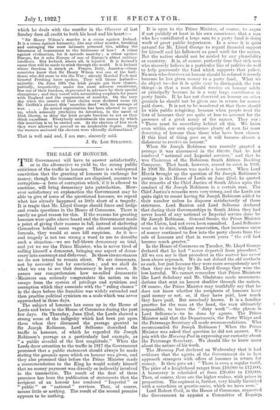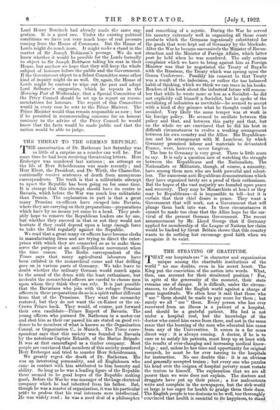THE SALE OF HONOURS. T HE Government will have to answer
satisfactorily, or in the alternative to yield to, the strong public criticisms of the traffic in honours. There is a widespread conviction that the granting of honours in exchange for money, though the transactions are disguised, amounts to corruption—a form .of corruption which, if it is allowed to continue, will bring democracy into putrefaction. How- ever satisfactory an explanation the Government may be able to give of some of the questioned honour; we regard what has already happened as little short of a tragedy. It is tragic that Mr. Lloyd George should fence and hedge and evade questions in the House of Commons'. There is surely no good reason for this. If the reasons for granting' honours were quite above board and the Government made a point of giving their reasons in full, instead of sheltering themselves behind some vague and almost meaningless formula, they would at once kill suspicion. As it is— and tragedy is not too strong a word to use to describe such a situation—we see full-blown democracy on trial, and yet we see the Prime Minister, who is never tired of calling himself a democrat, bringing one aspect of demo- cracy into contempt and disfavour. In these circumstances we do not intend to remain silent We are democrats, not by necessity but by conviction ; and we shall do what we can to see that democracy is kept sweet. It passes our comprehension how so-called democratic • Ministers can• seriously congratulate the nation on its escape from the system of privilege and cynicism and corruption which they associate with the " ruling classes " in the days before the franchise was' widely extended and then practise political cynicism on a scale which was never approached in those days. The subject of honours has come up in the House of Lords and twice in the House of Commons during the past few days. On Thursday, June 22nd, the Lords showed a strong sense of the indignity which had been put upon them when they discussed the peerage granted to Sir Joseph Robinson. Lord Selborne described the traffic in honours, of which he regarded Sir Joseph Robinson's peerage as a particularly bad example, as " a public scandal of the first magnitude." When the Lords drew attention to the traffic in 1917 the Government promised. that a public statement should always be made stating the grounds upon which an honour was given, and they also promised that before the Prime Minister made a recommendation to the Bing he would satisfy himself that no money payment was directly or indirectly involved in the transaction. The result of the first of these promises has been the publication of statements that the recipient of an honour has rendered " Imperial " or " public " or " national " services. That, of course, means little or nothing. The result of the second promise appears to' be nothing. It is open to the Primo Minister, of course, to argue if not publicly at least in his own conscience, that a mat who has contributed a large sum to a party fund is doin4 work of great public importance. In a sense it is quite natural for Mr. Lloyd George to regard financial support for himself and his followers as good work for the nation, But the nation should not be misled by any plausibility or casuistry. It is, of course, perfectly true that rich men who sincerely believe in a particular line of politics do well to help generously the fund which supports that policy. No man who deserves an honour should be refused it merely because he has given money to a party fund. What we do object to—for it is quite easy to distinguish the two things—is that a man should receive an honour solely or principally because he is a very large contributor to party funds. If he has not deserved an honour on other grounds he should not be given one in return for money paid down. It is not to be wondered at that there should be wide public misgiving, because when people read the lists of honours they are quite at loss to account for the presence of a great many of the names. They say : There must be something behind all this. We know even within our own experience plenty of men far more deserving of honour than those who have been chosen. If this End of thing goes on it will become almost a dishonour to receive an honour."
When Sir Joseph Robinson was recently granted a peerage 'it was announced in the Gazette that he had rendered " national and Imperial services," and that he was Chairman of the Robinson South African Banking Company. That bank, however, ceased to exist in 1905.
In 1908 Mr. Robinson was made a baronet. When Lord Harris brought up the question of Sir Joseph Robinson's- peerage in the House of Lords on June 22nd, lie quoted the remarks of the Chief Justice of South Africa upon the conduct of Sir Joseph Robinson in a certain case. The Chief Justice's remarks were very strong, and the Lords are quite right to resent having Sir Joseph Robinson added to their number unless he disposes satisfactorily of those strictures. Lord Buxton and Lord Selborne declared that during their Governorships in South Africa they had never heard of any national or Imperial service done by Sir Joseph Robinson. General Smuts, the Prime Minister of the Union, had not even been consulted. Lord' Selborne went on to state, without reservation, that immense sums- of money continued to flow into the party chests from the sale of honours and that in recent years " the evil had become much greater." In the House of Commons on Tuesday, Mr. Lloyd George declared that he had " never departed from precedent.", All we can say is that precedent in this matter has never been above reproach. We do not defend the old methods as such, but just because they were more scrupulously used- than they are to-day by Mr. Lloyd George they were the less harmful. We cannot remember that Prime Ministers like Lord Salisbury and Mr. Gladstone made recommen- dations that sent an honest shudder through the nation.
Of' course, the Prime Minister may -truthfully say that he does not know whether the recipients of honours have paid money or not, or, if they have paid, how much they have paid. But somebody knows. It is a familiar practice for the man at the head; the man ultimately responsible, to leave the " dirty work "—the phrase is Lord Selborne's—to be done by agents. The Prime Minister said that the Departments, the Party Whips and the Patronage Secretary all made recommendations. Who recommended Sir Joseph Robinson ? When the Prime Minister was asked that question he did not answer. We join with the Morning Post in expressing our curiosity about the Patronage Secretary. We should like to know more about the nature of his work.
The Morning Post declared on Wednesday that it had evidence that the agents of the Government do in fact approach strangers with offers of honours in return for money. It then goes on : " There is even a regular tariff. The price of a knighthood ranges from £10,000 to £12,000. A baronetcy is scheduled at from £30,000 to £40,000. Then; of course, there are the higher realms, with prices in proportion. The aspirant is, further, very kindly furnished with a catechism or questionnaire, which we have seen." Lord Robert Cecil, in the House of Commons, requested the Government to appoint a Committee of Inquiry. Lord Henry Bentinck had already made the same sug- gestion. It is a good one. Under the existing political conditions we have not very much hope of real pressure coming from the House of Commons. But the House of Lords might do much more. It might make a stand in the matter of Sir Joseph Robinson's peerage. We do not know whether it would be possible for the Lords formally to object to Sir Joseph Robir.son taking his seat in their House, but anyhow we hope that they will keep the whole subject of honours before the public and the Government. If the Government object to a Select Committee some other kind of inquiry might do as well. Or, again, the House of Lords might be content to wipe out the past and adopt Lord Selborne's suggestion, which he repeats in the Morning Post of Wednesday, that a Special Committee of the Privy Council should be set up to report on recom- mendations for honours. The report of this Committee would in every case be sent to the Prime Minister. The Prime Minister would thus remain responsible as now ; but if he persisted in recommending someone for an honour contrary to the advice of the Privy Council he would know that the facts would be made public and that the nation would be able to judge.











































 Previous page
Previous page